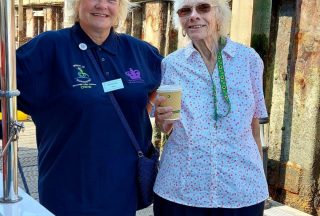Until very recently, Jennifer and her husband Patrick ran a successful 30 acre farm growing wholesale organic cherry tomatoes in the Dorset countryside. They learnt from scratch, and built up with second-hand equipment to wholesale large quantities, and supplied most of the national supermarkets with their produce.
A few years ago, Jennifer and the couple’s children began to notice a gradual decline in her husband’s mental health. After some time they managed to convince him to go and see his GP. It then took a while for a referral to come through and for a mental health consultant to diagnose Patrick with frontal temporal dementia. There was a long time to muddle through without help, advice or possible contacts, before diagnosis. It is this void that Jennifer is hoping to draw attention to, in order for it to be addressed, as she emphasises that carers crucially need help at this early stage, particularly if they are involved in farming.
From that point onwards, Patrick’s health declined further and Jennifer realised that there was a lot to the farm that she didn’t know about – all jobs that her husband had typically organised or done himself in the past.
Jennifer felt she lacked support in knowing where to start with things. For example, a large water bill for the farm came through, due to a leak, and she wasn’t aware she needed to read the meter so often. The farm buildings were beginning to fall into disrepair and she needed to know which crises to deal with first. Again, all things that typically Patrick would do in his stride and Jennifer was concerned about the buildings getting into a further state of dereliction and ultimately it affecting the viability and value of the farm.
What Jennifer needed was an Angel in Gumboots!
The challenges of caring
Whilst caring, Jennifer was offered the chance to book onto a 7-week dementia course but unfortunately it was too far away to travel to and it simply wasn’t possible to leave her husband for 4 hours each time. They were also given the opportunity to visit another farm but this was more aimed at reconnecting people from farming backgrounds to their rural roots rather than to support her with the day-to-day running of their own farm.
Jennifer’s main solace is her faith, the regular visits from their children and so many neighbours offering help and safety, particularly at times when Patrick’s condition caused him to have aggressive outbursts.
One thing that Jennifer found particularly helpful and would strongly recommend other carers in her situation to do, is to pick up a copy of Oliver James’s book Contented Dementia, ISBN 978-0-09-190181-3. This book is one Jennifer found in a bookshop, and she thinks it should be essential basic reading.
Moving to a care home
Recently, with the decline in Patrick’s health, he was moved into a specialist dementia care home. Jennifer and their family can visit him fortnightly, although restrictions were imposed at the peak of the Covid-19 outbreak. Jennifer takes along photos to show him of their family, horses and dogs, and his seafaring life, and is also creating a photo album for his carers so they can talk to him about his family. It can help to ground him on days when his delusions take over.
Although Jennifer is no longer a carer for her husband, she is passionate about spreading the word of carers like herself. She has been in touch with the Farming Community Network and the Royal Agricultural Benevolent Institution to try and establish what they can offer to help people in similar rural farming situations.
If you, or someone you know is a carer in a rural situation, please get in touch with us here at Carer Support Dorset. We will do all that we can to support you on your caring journey.
The painting featured in this story is by Jennifer and features the couple’s farm.



